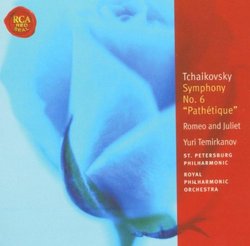| All Artists: Peter Tchaikovsky, Yuri Temirkanov, Royal Philharmonic Orchestra Title: Tchaikovsky: Symphony No.6 Pathetique Members Wishing: 0 Total Copies: 0 Label: RCA Release Date: 10/12/2004 Album Type: Original recording remastered Genre: Classical Style: Symphonies Number of Discs: 1 SwapaCD Credits: 1 UPC: 828766232028 |
Search - Peter Tchaikovsky, Yuri Temirkanov, Royal Philharmonic Orchestra :: Tchaikovsky: Symphony No.6 Pathetique
 | Peter Tchaikovsky, Yuri Temirkanov, Royal Philharmonic Orchestra Tchaikovsky: Symphony No.6 Pathetique Genre: Classical |
Larger Image |
CD Details |
CD ReviewsTemirkanov's Definitive, Resplendent Tchaikovsky 6th Grady Harp | Los Angeles, CA United States | 04/03/2005 (5 out of 5 stars) "This recently remastered recording of two of Tchaikovsky's most moving works by the poet laureate of Russian conductors Yuri Temirkanov is a welcome return to the library of one of the finest recorded CDs in the library. And the RCA Red Seal Classic Library price of under ten dollars makes it without question the most valuable recording of these works available! The 'Romeo and Juliet' was recorded in 1989 with the Royal Philharmonic Orchestra in All Saints' Church, Tooting , London and while the performance is luxuriously bracing the sonics and ambience of the recording are a bit on the mushy side. Get past that factor and the reading by Temirkanov is richly detailed and plangent. Rarely have the secondary string motifs been so securely supportive and the overall feeling of this performance is one of most fatalistic tenor. Probably no other conductor can capture the pathos and yearning of Tchaikovsky's lament for the young lovers. The 'Pathetique' was recorded in 1992 with the St Petersburg Philharmonic Orchestra playing in their own Philharmonic Hall. The recorded sound is as spacious and dark as befits this great symphony. Temirkanov knows this work so well that it holds his fingerprints of development of inner voices, seemingly nonchalant phrasing (so naturally are they played), and with a sense of momentum that the entries to every thematic change are simply miraculous: the longing, heartbreakingly beautiful theme in the first movement is approached like a priest to an altar. The Allegro con grazia manages to dance without the usual swoops that can make it seem out of place. And the following Allegro molto vivace is lightly paced allowing all of the underlying activity in the strings to actually be heard in the portions where the brass and woodwinds dominate. But it is in the Finale that Temirkanov and his own orchestra shine most radiantly. Here is the quintessential Russian soul at times elusive in performances and recordings here in this country. The tension never relaxes at the expense of the well-conceived line that pulls this movement to a close. Gone are the usual speedy tempi that sometimes Temirkanov indulges in: this is simply the beauty of Tchaikovsky speaking at his most eloquent and most resigned. It would be difficult to imagine a better performance. Highly recommended. Grady Harp. April 05" Lovely Russian sounds abound, but the interpretation feels o Santa Fe Listener | Santa Fe, NM USA | 05/18/2006 (4 out of 5 stars) "One expects a lot from any recording of the Pathetique, which has received more great readings than any other single work by Tchaikovsky. In fact, from Furtwangler to Toscaninni, Karajan to Levine, Giulini to Mravinsky, Monteux to Bernstein, the wealth of inspired recordings is fathomless. This St. Petersburg recording under Temirkanov has detailed, natural sonics with wide-ranging dynamics. The orchestra produces some tangy Russian woodwind sounds, and the playing is typically forward and alert. Having said that, I don't feel Temirkanov brings anything special from the podium--his tendency is to underplay the music's passion, which doesn't work. The opening of the first movement is gentle and sweet, for example, but nothing more. There's plenty of stylishness throughout. I only wonder where the tragedy is, the deep emotional connection. This listener didn't feel it, even though I can see why someone else might admire such a refined reading. The Romeo and Juliet with the Royal Phil. is a bit too staid, also. I'm a great fan of Temirkanov and can count any number of great performances from him, just not this one." Very slow but it works!! Scriabinmahler | UK | 02/11/2008 (5 out of 5 stars) "
Temirkanov chooses dangerously slow tempo for the outer movements (1st movement 20:29/the last 12:01)and probably he is the only conductor who succeeds in this unusually slow pace, while Bernstein and Giulini make complete mess of the whole symphony (Both DG). He introduces the beautiful second theme very slowly with amazing tenderness, but never lets it distort the whole picture of the movement. When the theme returns again, after the explosive outburst, it is most beautifully sung in impressive grandeur. The last movement is a bit too slow, but again the conductor manages to hold slow sections and fast sections seamlessly and achives profoundly elegiac mood. The inner two movements are also very good. If you are after different interpretation of Pathetique played slowly to relish the beautiful melodies without losing intensity and power, this is most recommendable along side Giulini's EMI version which is very similar in approach." |
